
Why do Police Wear Blue Uniforms? (History Explained)
home >> blog articles > why do police wear blue uniforms? (history explained)
By Brian Humenuk MS|CJA COPJOT
Release Date: March 29, 2024
4-minute read
Have you ever wondered why globally many law enforcement officers wear blue? Are you wondering right now “why do cops wear blue” and that is why you landed on this article?
Or….
Did you just see the title of this article and thought to yourself that this is an interesting phenomenon that I would love to know more about?
Either way you’re in luck. This article is going to get to the nuts and bolts of the reasons police officers wear blue.
LEARN MORE: If you are new to COPJOT and me as an author please check out my other articles here at the blog index.
and...
Be sure to read my next article >> Strategic Color Choices in SWAT Team Uniforms [Explained] <<
Introduction
In the vast interwoven world of law enforcement, one element stands out prominently: the blue uniform worn by police officers worldwide.
Beyond its practicality, the color blue holds deep symbolic significance within policing and shades of blue that make up law enforcers uniforms is noticed all over the globe.
In this article I dive into what it is about the color blue that correlates with law enforcement uniforms.

I will deep dive into the history, meaning, and cultural implications behind the iconic blue police uniform. From its origins to its enduring legacy, I am going to unravel the reasons why cops wear blue and the symbolism it carries.
The Historical Context of Police Blue Uniforms
To understand the prevalence of blue in police uniforms, we must journey back to the early days of modern law enforcement.
During the formation of organized police forces in the 19th century, uniforms were adopted as a means of establishing authority, instilling discipline, and fostering a sense of identity among officers.
During this time period the adoption of blue uniforms marked a significant shift in law enforcement attire. While the specific origins may vary across regions and jurisdictions, historical records suggest that the transition to blue uniforms occurred gradually during this period.
One notable example is the London Metropolitan Police, established in 1829 by Sir Robert Peel, which introduced blue uniforms for its officers.
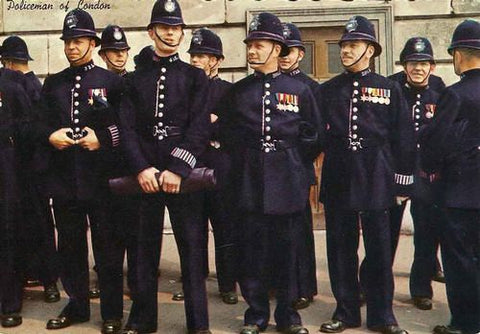
The choice of blue was influenced by practical considerations, such as its visibility and durability, as well as symbolic associations with authority and professionalism.
Over time, the tradition of wearing blue uniforms spread to other police forces worldwide, becoming a hallmark of law enforcement attire. Thus, the early 19th century serves as a pivotal era in the history of policing, marking the emergence of the iconic blue uniform that continues to symbolize law enforcement to this day.
The Emergence of Blue
While police uniforms initially varied in color and style, blue gradually emerged as the predominant hue among law enforcement agencies.
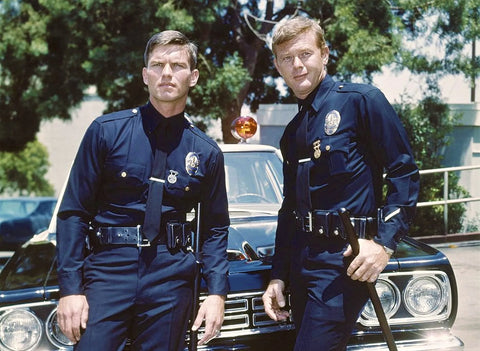
One significant reason for this was the association of blue with authority, professionalism, and trustworthiness. Blue conveyed a sense of calmness, stability, and reliability, qualities deemed essential for maintaining public order and enforcing the law.
The Symbolism of Blue in Policing
The symbolism of blue in policing extends beyond its aesthetic appeal. It carries profound connotations that resonate with the core values and principles of law enforcement.
Here are some key aspects of the symbolism of blue in policing
Authority and Respect
The color blue is synonymous with authority and command. By donning blue uniforms, police officers project a sense of authority and command respect from the public they serve.
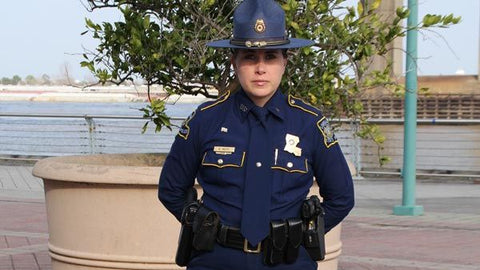
The uniform serves as a visible reminder of the officer's role as a guardian of the peace and protector of the community.
Professionalism and Trustworthiness
Blue is often associated with professionalism, competence, and trustworthiness.
Police officers wearing blue uniforms are perceived as competent professionals who uphold high standards of integrity, ethics, and professionalism.
The uniform itself symbolizes the officer's commitment to serving with honor, integrity, and dedication.
Unity and Solidarity
The uniformity of blue uniforms has largely grown popular over time and fosters a sense of unity, solidarity, and camaraderie among police officers. It promotes a cohesive identity and reinforces the notion of teamwork and collaboration in law enforcement.
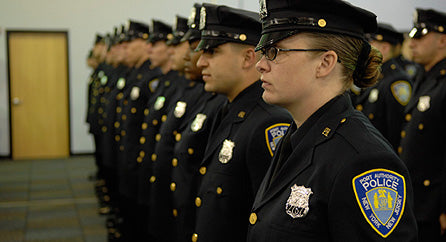
Officers wearing blue stand together in their mission to uphold the law and protect the community.
Visibility and Recognition
Blue uniforms enhance the visibility and recognition of police officers in public spaces. The distinctive color makes officers easily identifiable, enabling members of the public to seek assistance, report crimes, or approach officers for help.
This visibility contributes to a sense of safety and security within the community.
Psychological Effects
The color blue is known to have psychological effects on individuals as well, evoking feelings of calmness, security, and trust.
RELATED: Here's Why Police Lights are Red and Blue (History Explained)
By wearing blue uniforms, police officers aim to create a sense of reassurance and safety within the community, fostering positive interactions and building trust with the public.
Psychological Effects as a Negative Context
In the eyes of a growing segment of society, the color blue of police uniforms no longer represents protection and justice but rather instills fear and apprehension.
The association arises from a litany of tragic incidents and systemic injustices, where the uniform has been worn as a shield for abuse of power and racial discrimination.
The Evolution of Police Uniforms
Over time, the design and functionality of police uniforms evolved to meet the changing needs of law enforcement agencies, incorporating features for comfort, mobility, and visibility.
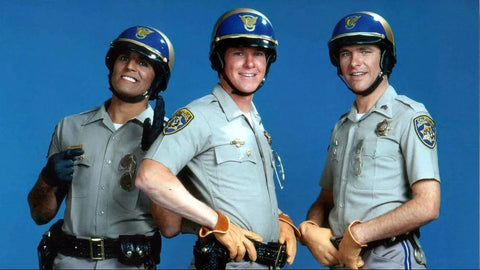
While the tradition of wearing blue uniforms remains steadfast, the design and style of police uniforms have evolved over time to reflect changing trends, technologies, and cultural norms.
Modern police uniforms prioritize functionality, comfort, and safety, while still honoring the tradition and symbolism of the iconic blue color.
Uniform Police Colors
Police uniforms are typically designed with police colors such as dark blue or black, chosen for their practicality and symbolic significance.
These police colors convey authority and professionalism while effectively hiding stains and wear from daily activities.
Dark blue, in particular, is associated with trust and reliability, helping officers maintain a calm yet authoritative presence.
The use of these specific colors ensures officers are easily recognizable and respected by the public, reinforcing their role in maintaining safety and order.
What other color uniforms do Law Enforcement Officers wear?
While the blue uniform is often synonymous with law enforcement, it's important to recognize that not all officers wear this color. Across different jurisdictions and specialized units, law enforcement agencies employ a variety of uniform colors to denote their roles and responsibilities.
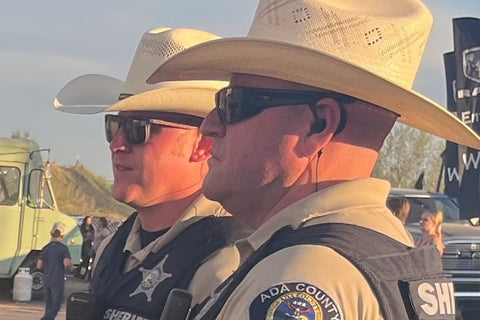
For instance, in many urban areas, transit police officers may wear distinct uniforms, such as the black and yellow attire of New York City's Transit Bureau or the brown uniforms of Los Angeles' Metro Police. Similarly, park rangers frequently don green or khaki uniforms to blend into natural environments while enforcing laws within parks and wildlife areas.
Additionally, sheriff's deputies in some regions may wear khaki or tan uniforms, differentiating themselves from municipal police forces.
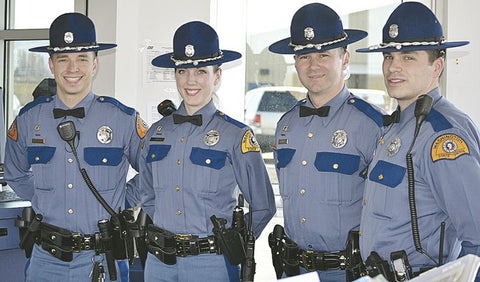
These variations in uniform color serve not only to distinguish different branches of law enforcement but also to reflect the unique environments and duties of officers beyond the traditional blue uniform.
Conclusion
The blue police uniform stands as a timeless symbol of authority, professionalism, and service in law enforcement.
Its rich history, cultural significance, and symbolic associations have cemented its place as an iconic emblem of policing worldwide.

From its origins to its enduring legacy, the blue uniform continues to embody the values, traditions, and ideals of law enforcement agencies around the globe.
It also marks the solidarity in police officers which gives law enforcers a sense of family or unity in their quest to be the global keepers of peace.
So, the next time you see a police officer in their distinctive blue uniform, remember the profound symbolism it carries and the dedication it represents in serving and protecting our communities.
About the Author
Brian Humenuk isn't just an entrepreneur in eCommerce, he is also an informed leader whose experience provides followers and visitors with a look into current and past police issues making headlines in the United States.
Brian has earned three degrees in Criminal Justice with the last, a Masters of Science in Criminal Justice Administration.
Brian extends his training, education, and experience to the officers just now getting into the field so that they may become more informed police officers and stay clear of police misconduct and corruption.
You can find out more about Brian and the COPJOT story on the ABOUT US page.
Affiliate Disclosure
COPJOT is supported by its audience. If you make a purchase through links on this site I may earn a small affiliate commission. Enough to buy myself a small coffee and I want to thank you in advance.
More Information
Are you a Police Officer, Sheriff or State Trooper, Law Enforcement family member or friend check out our Custom Police Notebooks and Metal Police Uniform Pens here on our main website.
Related Articles
Best Affordable Metal Police Officer Pens
What are the best police duty bags? (Ultimate Guide)

